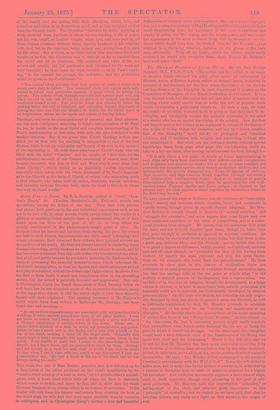The Theory of Evolution of Living Things. By the Rev.
George. Henslow, M.A., F.L.S., F.G.S. (Macmillan and Co.)—This is an essay or treatise which obtained the prize given under an endowment by Hannah Acton, of Euston Square, widow of Samuel Acton, architect, in memory of her husband, for the best essay illustrative of the wisdom and beneficence of the Almighty, in such department of science as the Committee of Managers of the Royal Institution should select. It is a very learned book, but the author has not that kind of mastery over his. learning which could enable him to write the sort of popular work which we conceive a prize essay should be. In such a case, we want the results of scientific research to be so given as that they shall be in- telligible, and intelligibly sustain the author's argument, to the mind of a reader who has no special knowledge of the subject. Now the first and largest part of the volume is an argument in favour of the theory of the origin of living things by evolution, and not by " direct creative fiats of the Almighty." based chiefly on geological and botanical evidence, and is doubtless both weighty and interesting to those who can understand it. But what can the ordinary reader, without special knowledge, learn from page after page like the following, which we take as a fair specimen, after having ourselves read the book through ?— " It is only when a few suites of fossils of forms approximating to each other only have been discovered that differences are conspicuous, and so genera and species are made ; but as soon as large numbers are procured, the supposed species often vanish as distinct entities, and not unfrequently the genera disappear too. Thus, of species of molluscs, Mya areaaria, and Mya truncata blend together through intercalary and intermediate contemporary forms. And as an example of genera differentiated from a common stock, may be mentioned the two well- marked forms PuTura lapillus and Flaws antiquus, so distinct at the present day ; yet they appear to blend together by intercalary forms in the Red-Crag deposit."
We have opened the page at Molluscs, but the evidence of "intercalary forms" among and between fishes, reptiles, birds, and mammals is. equally strong, though given in equally obscure language. Mr. Hen- slow declines to commit himself to theories of " natural selection " and "struggle for existence," and even argues that some types may owe their continued existence to the want of competition, and to a conse- quent freedom from struggle. He insists that his endeavour is to state the facts, and not to build theories upon them, though he holds that they point strongly to evolution as opposed to separate creations. As regards man, he shows that there are many links, but that there is also a great gap, between Homo and the Simiadm ; and he insists that there is so great a degree of difference, bodily, mental, and spiritual, between man and all other animals, as " precludes the idea of his having been evolved by exactly the same processes and with the same limita- tions as, for example, the horse from the palaeotherium." He then proceeds to show that in the history of civilisation there are evidences of an analogous process of evolution through successive ages, but that the analogy fails at the one point at which what "is not entirely a natural process of development, but a regeneration," was needed :—" in the case of religion, though the development, to a large extent, is natural, or at least in accordance with natural principles, yet humanity could not be restored, nor Christianity developed, by natural processes alone." On this basis of evolution, but evolution not only origin- ally designed by God, but also in its greatest moments directed, as well as habitually maintained, by God, Mr. Henslow proceeds to establish the argument of his essay for the wisdom and beneficence of the Almighty." Ho frankly admits the onesidedness of the usual reasoning of writers like those of the " Bridgewater Treatises" on this subject :— " An ichneumon fly, had it reasoning powers, might easily conclude that caterpillars were beneficently designed for its use, as being the place in which it should lay its eggs. On the other band, the caterpillar would have a very different view of the beneficence of the Being who made both itself and the ichneumon." There is the difficulty, and we do not see that Mr. Henslow has been more successful in solving it by the doctrine of evolution than others before him by any other doctrines In fact, he falls back, as we all do at last, on the position that God's mind is inscrutable. He says, " The Wisdom of God as displayed in the works of Creation is synonymous with the Will of God." It was the will of God to. make man, and to make him by the method of evolution, in order that by a process of discipline here on earth he might be prepared for a higher life hereafter. And evolution necessarily supposes a succession of steps, each in itself imperfect, though each advancing to the goal of ulti mate perfection. Mr. Henslow calls this imperfection " inideality," or falling-short of the ideal, and attaches great importance to this. "principle " of inideality ; but we cannot, as we have said, find that he has thus thrown any really new light on that mystery, the origin of evil.






































 Previous page
Previous page